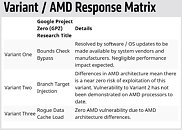Wednesday, January 3rd 2018

AMD Updates on AMD Processor Security Status
There has been recent press coverage regarding a potential security issue related to modern microprocessors and speculative execution. Information security is a priority at AMD, and our security architects follow the technology ecosystem closely for new threats. It is important to understand how the speculative execution vulnerability described in the research relates to AMD products, but please keep in mind the following:
As the security landscape continues to evolve, a collaborative effort of information sharing in the industry represents the strongest defense.
Total protection from all possible attacks remains an elusive goal and this latest example shows how effective industry collaboration can be.
As always, AMD strongly encourages its customers to consistently undertake safe computing practices, examples of which include: not clicking on unrecognized hyperlinks, following strong password protocols, using secure networks, and accepting regular software updates.
- The research described was performed in a controlled, dedicated lab environment by a highly knowledgeable team with detailed, non-public information about the processors targeted.
- The described threat has not been seen in the public domain.
As the security landscape continues to evolve, a collaborative effort of information sharing in the industry represents the strongest defense.
Total protection from all possible attacks remains an elusive goal and this latest example shows how effective industry collaboration can be.
As always, AMD strongly encourages its customers to consistently undertake safe computing practices, examples of which include: not clicking on unrecognized hyperlinks, following strong password protocols, using secure networks, and accepting regular software updates.

20 Comments on AMD Updates on AMD Processor Security Status
Also, 3 flaws now, so the problem tripled! Variants 2 and 3 affect ARM and Intel it seems. Not nice!
www.businessinsider.com/intel-ceo-krzanich-sold-shares-after-company-was-informed-of-chip-flaw-2018-1
Assumptions that next code will be kinda deal.
But the bad part is intel's downplay of the issue and calling out others to drag them down with them
Intel wants to pretend AMD is in the same boat.
isc.sans.edu/diary.html?utm_content=bufferbb5f4&utm_medium=social&utm_source=twitter.com&utm_campaign=buffer
meltdownattack.com/
These vulnerabilities have been shown to affect every CPU with execution prediction on all OS platforms. Only Apple's iOS is relatively safe, but there are indications that it too has some susceptibilities.
This is NOT an Intel problem. It is VERY much an everyone problem.
(Sometimes I feel like a broken record..)
None of the bugs were used according to google, variant 2 is basically impossible to exploit on older AMD cpu's and variant 3 is applicable to Intel and ARM CPU's. So, AMD made a mistake, but may have fixed it with Ryzen, so I should be mad at AMD, but that issue is overshadowed by Intel's problems which actually can cause MAJOR performance hits! AMD's problem was/will be fixed without a performance hit and was(/is) significantly smaller than Intel's problem anyway!
Basically old AMD was rubbish, new AMD is amazing and Intel is still the irresponsible, whining rich kid!
meltdownattack.com/
Read
Now go watch some iOS 11.2 and 11.2.1 vs iOS whatever videos. No unusual discrepancies."That's an assumption not backed by merit." It is pretty much common knowledge that Intel is the only one pushing their problems off on others. They started blabbing on all the others and everyone else gave statements that yes, there are vulnerabilities, but they are fixing/have fixed the problem to some extent and warn not to download malicious apps that could exploit the vulnerabilities. To make it more understandable for some people, it's basically the difference between a toddler's response (They did it too!!!) and a grown-up's response (There is something wrong, but we're working on fixing it. Just don't do this ... or this .... and you'll be fine.).
Go read the other statements.